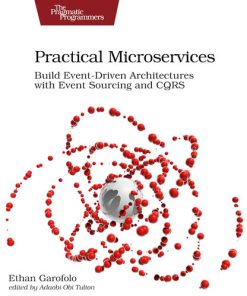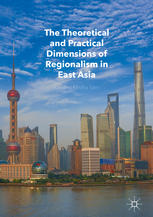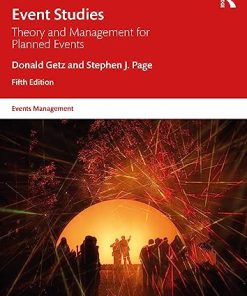Event Management in Sport, Recreation and Tourism Theoretical and Practical Dimensions 4th Edition by Cheryl Mallen 1003830474 9781003830474
$50.00 Original price was: $50.00.$25.00Current price is: $25.00.
Event Management in Sport, Recreation and Tourism: Theoretical and Practical Dimensions 4th Edition by Cheryl Mallen – Ebook PDF Instant Download/DeliveryISBN: 1003830474, 9781003830474
Full download Event Management in Sport, Recreation and Tourism: Theoretical and Practical Dimensions 4th Edition after payment.

Product details:
ISBN-10 : 1003830474
ISBN-13 : 9781003830474
Author: Cheryl Mallen
Now in a fully revised and updated fourth edition, Event Management in Sport, Recreation, and Tourism provides a comprehensive theoretical and practical framework for planning and managing events at all levels, from smaller local events to mega-events. Focusing on the role of event manager and their diverse facilitation responsibilities through each phase of the event planning process, the book is designed to encourage critical thinking, to help the reader to become an adaptable and capable manager ready to cope with the constantly evolving challenges of the contemporary events landscape. The book begins with an updated chapter on the types of knowledge in event management, posing questions that help readers to understand their current knowledge, to decide what they need to pursue, and to advance their knowledge strategies. Containing a rich array of international, real-world case studies, data, and practical examples, from traditional and niche sport, recreation, and tourism contexts, this fourth edition is enhanced by a completely new chapter on practical advances in environmental sustainability that provides an overview of research as well as strategies for moving forward. The book goes further than any other event management textbook in placing social, ethical, and environmental responsibilities at the centre of the event planning process. Event Management in Sport, Recreation, and Tourism is an essential reading for any student or practitioner working in event management, sport management, leisure management, outdoor recreation, or tourism.
Event Management in Sport, Recreation and Tourism: Theoretical and Practical Dimensions 4th Table of contents:
1 Hosting traditional and niche events in sport, recreation, and tourism: Knowledge required for success in practice
Pursue perspicacity
Nurture your flexibility effect
Understand niche and traditional events
Niche events
Traditional events
Build your bank of knowledge for hosting niche and/or traditional events
Common knowledge
Advancement knowledge
Plan to advance your common and advancement knowledge
Conclusion: So, what do you need to know to build for success in sport, recreation, and tourism event management?
Chapter questions
References
2 Building fundamental knowledge to be a facilitator of events
Facilitation by Amy Cunningham
What is facilitation?
Facilitating communication requirements
Facilitating group communication requirements: the case of group rhythm and facilitation
Facilitating knowledge transfer
Facilitating event structures for governance by Joanne MacLean
Event structures
Theoretical dimensions of event structures
Principles in event structures
Application of theory and principles in event structures
Conclusions
Chapter Questions
References
3 The development phase of the event planning model
Facilitating the development of event goals and objectives
Examples of event goals and objectives
Facilitating event policy development
Facilitating policy congruence
Assignment A – Staff and volunteer training program
Assignment B – Event contracts
Assignment C – Event permits and liability insurance
Assignment D – The event communication system
Example: Policy becomes praxis
Assignment E – The event communication system
The challenge of facilitating policy statements into practice
Facilitating event volunteer management by Lorne Adams
A volunteer management program
Conclusions
Chapter questions
References
4 The event operational planning phase of the event planning model
Mechanism 1: The cultivation of the operational planning network
Application of contingency theory
Application of complexity theory
Application of dissipative structures
Application of agency theory
Application of the theory of marginal gains
Mechanism 2: Generating written operational plans
The written event operational plan: Establishing a design format
Logical operational planning
Sequential operational planning
Detailed operational planning
Assignment A: Level 3 planning
Mechanism 3: The inclusion of contingency and emergency plans
Assignment B: Contingency issues
Mechanism 4: Update and test the communication system
Assignment C: Develop a diagram of the communication structure
Mechanism 5: Establish meeting agendas
Assignment D: Meeting agenda development
Mechanism 6: Integrating the operational plans between event components
Assignment E: Integration of operational plans
Mechanism 7: Prepare for event issues and political ‘games’ with a guiding ethical statement
Mechanism 8: Preparing for the activation of the operational plans
Mechanism 9: Practice to develop your operational planning skills
Conclusions
Chapter questions
Appendix A: Case study – An event volunteer management operational plan
Case assignment
Appendix B: Case study – Segments of operational plan for event transportation
Appendix C: Case study – Sections of operational plan on the hospitality component
5 Issues and management strategies in event operational planning
Defining issues management
Knowledge in issues management
Best practices
Events as legacies
Event issues and management strategies
Timing issues
Accountability/authority issues
Knowledge management issues
Funding issues
Relationship issues
Turnover of staff/volunteer’s issues
Case assignments
What can event managers do about arising event issues?
Conclusions
Chapter questions
Appendix: A research strategy for determining event issues and strategies
A modified Delphi research technique
The interview and questionnaire framework
The Delphi participants
Data analysis
6 The event implementation, monitoring, and management phase of the event planning model
Implementation: executing the plan
Disseminating implementation requirements and hosting production meetings
Monitoring the dynamic and fluid operational environment
Managing operational plan implementation
Overcome foreseeable failure when managing deviations from the plan
Predetermine the decision-making team and process
Programmed and non-programmed decisions
Inherent implementation, monitoring, and management issues in operational network practice
Issue: operational plan detail and implementation performance
Issue: implementation knowledge and performance
Issue: Deviations from the plan
Issue: Implementation conflict
Issue: Implementation communication
Conclusions
Chapter questions
References
7 The event evaluation and renewal phase of the event planning model
Background knowledge for the event manager
What is an evaluation?
Why is evaluation necessary?
What are the key evaluation questions to ask?
What are the other areas of consideration when designing an evaluation?
What is the role of theory in evaluating events
What are the general steps for conducting evaluations and making decisions?
The Three Horizons for event renewal and growth over time
Conclusions
Chapter questions
References
8 Safeguarding the natural environment in event management
What is environmental sustainability?
Why is environmental sustainability important in event management?
Environmental change, vulnerability, and the need for resilience and adaptation for sport, recreation, and tourism events
Roles and responsibilities for environmental sustainability in event management
The triple top line and the triple bottom line
Life cycle assessment
Carbon footprint
Ecological footprint
Assignment A: Understanding event-related, environmentally focused organizations
Assignment B: Event decision-making for environmental sustainability
Assignment C: Ace Corporation Triathlon Group (ACTG) sustainability ownership and accountability
Assignment D: Using a carbon footprint to minimize accommodation impact
Conclusions
Chapter questions
References
9 Environmental sustainability in sport, recreation, and tourism: “You ain’t seen nothing yet”
Calls to enact environmental sustainability
Sport, recreation, and tourism environmental sustainability in practice
Events and network relationships that aid in environmental sustainability
Events and environmental awareness programs
Event actions toward carbon neutrality to improve air quality
Event facilities and environmental sustainability
Event facilities and renewable energy
Event facilities generating waste mitigation and efficiencies
Event facilities and water safeguards
Events and other environmental strategies
Research in event sport, recreation, and tourism environmental sustainability
Moving forward in event environmental sustainability
Apply appreciative theory for a mindset that seeks solutions
Embed environmental actions
Generate leadership to guide the way forward
Conclusions
Chapter questions
References
10 Event bidding
What is a feasibility study?
What is a candidature document?
What is a bid questionnaire?
What is a bid dossier?
What is a bid tour?
What are the critical factors in a successful bid?
What is one critical factor for bid success?
Conclusions
Chapter questions
References
11 Politics in event bidding and hosting
What is meant by the “politics of events?”
Politics in the decision to bid or not to bid
Politics in the event bid phase – the committee
Politics in the event bid phase – the proposal
Politics in the event bid phase – the decision-makers
Politics in the event bid transition and review phase
Politics in the event hosting phase
Overcoming politics in event bidding
A key factor in managing event politics – consistent communication messaging
A key factor in managing event politics – establishing core values
Conclusions
Chapter questions
References
12 Facilitating quality in event management
Can an event manager meet all requirements for quality?
What is quality?
Quality is defined as ruggedness and longevity in the manufacturing industry
Definitions for quality in the service industry
Expanded meanings of quality
Quality is conformance to specifications
Quality is excellence
Quality is value
Quality is meeting and/or exceeding customers’ expectations
Aesthetic quality
Functional quality
Technical quality
A lack of guidance for quality in event management
Issues in creating quality statements and defining quality in event management
Limited control over inputs influences quality
Financial constraints influence quality
Issues in stakeholder expectations as quality perceptions
Contingency plans influence quality
Assignment 1: Evaluate sample quality statements
Quality statement for Rally in the Valley
Quality statement for Nantou Balloon Fest
Quality statement for Rocking on the River
Assignment 2: Generate your quality statement for the work of an event manager
Conclusions
Chapter questions
References
13 Conclusions
People also search for Event Management in Sport, Recreation and Tourism: Theoretical and Practical Dimensions 4th:
event management in sport recreation and tourism
sports events management courses
event management in recreation and tourism
a sport marketing and event management agency is defined as
sport venue and event management
Tags: Event Management, Sport, Recreation, Tourism, Practical Dimensions, Cheryl Mallen
You may also like…
Hobbies & Games
Social Issues in Sport 4th Edition by Ronald Woods, Nalani Butler ISBN 9781492593867 1492593869
Hobbies & Games
Business & Economics - Industries
Computers - Programming
Cookbooks
Politics & Philosophy
Business & Economics - Sales & Marketing
Uncategorized
Event Studies: Theory and Management for Planned Events (Events Management) 5th Edition Getz
Politics & Philosophy - Social Sciences












